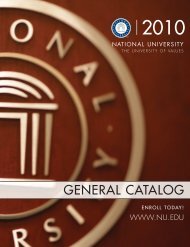Journal of Research in Innovative Teaching - National University
Journal of Research in Innovative Teaching - National University
Journal of Research in Innovative Teaching - National University
Create successful ePaper yourself
Turn your PDF publications into a flip-book with our unique Google optimized e-Paper software.
The English Class and Global Education<br />
There is still a controversy as to why the English class should be s<strong>in</strong>gled out for global<br />
education. Some skeptics believe it is a storm <strong>in</strong> a teacup, s<strong>in</strong>ce other discipl<strong>in</strong>es address global<br />
issues. But this is not evident <strong>in</strong> curriculums across nations. In the Cameroon school system, for<br />
<strong>in</strong>stance, the regular curriculum as def<strong>in</strong>ed by the M<strong>in</strong>istry <strong>of</strong> Secondary Education comprises<br />
s<strong>in</strong>gle subjects such as biology, chemistry, math, history, geography, economics, citizenship and<br />
English language. The observation is that aspects <strong>of</strong> global education appear <strong>in</strong> some subjects at<br />
different levels as relevant to the course <strong>in</strong> question. Biology, for example, covers HIV/AIDS,<br />
malaria, and other health issues; <strong>in</strong> history is found issues <strong>of</strong> war, peace, and conflict resolution;<br />
geography highlights natural disasters and environmental protection; economics deals with world<br />
economies, poverty, and food security; and citizenship may cover such issues as human rights,<br />
social justice, and community service. English, French, Spanish, and German are the only<br />
subjects that may conta<strong>in</strong> a lot <strong>of</strong> global issues <strong>in</strong> the form <strong>of</strong> comprehension passages or <strong>in</strong><br />
prescribed literature textbooks.<br />
However, despite attempts to <strong>in</strong>clude global issues <strong>in</strong> the school curriculum, it is not done<br />
<strong>in</strong> a conscious or systematic manner. The evidence is that many other aspects <strong>of</strong> global education<br />
rema<strong>in</strong> conspicuously absent or dormant. Some examples are gender and discrim<strong>in</strong>ation, peace<br />
education, critical th<strong>in</strong>k<strong>in</strong>g, and universal/moral values. Moreover, the Anglophone subsystem <strong>of</strong><br />
education <strong>in</strong> Cameroon tends toward specialization, permitt<strong>in</strong>g students to concentrate on only a<br />
few subjects <strong>of</strong> their choice at a higher level. This dim<strong>in</strong>ishes the opportunity for a cont<strong>in</strong>ued<br />
global education as conta<strong>in</strong>ed <strong>in</strong> a wide variety <strong>of</strong> subjects. English and the other languages<br />
rema<strong>in</strong> the only universal subjects for a possible cont<strong>in</strong>uity <strong>of</strong> global teach<strong>in</strong>g and learn<strong>in</strong>g.<br />
Recall<strong>in</strong>g what Jacobs and Cates (1999) state, global education should be a regular and<br />
consistent part <strong>of</strong> the curriculum and not thrown <strong>in</strong> randomly. This can be achieved <strong>in</strong> the<br />
language classroom.<br />
I agree with Maley’s (1992) observation that some English textbooks (as is the case <strong>in</strong><br />
Cameroon) treat global issues superficially, dwell<strong>in</strong>g more on the l<strong>in</strong>guistic aspect. Yet it is<br />
evident that English (or any language class) <strong>of</strong>fers the ideal opportunity for the realization <strong>of</strong> a<br />
global education. Teachers must be able to seize the said opportunity to <strong>in</strong>tegrate global issues <strong>in</strong><br />
their teach<strong>in</strong>g. Naturally, language teach<strong>in</strong>g/learn<strong>in</strong>g is <strong>in</strong>complete without a social context,<br />
given its role as a factor <strong>in</strong> human social, political, and economic behavior. And because<br />
language is not subject specific, it provides a convenient context <strong>in</strong> which to discuss topics <strong>of</strong><br />
concern to students and address all global issues. The “content proper” (which is essentially<br />
grammar and vocabulary and the language skills) is usually taught us<strong>in</strong>g the “content carrier,”<br />
which consists <strong>of</strong> issues <strong>in</strong> everyday life (Medgyes, 1998). This implies that any text or subject<br />
matter could be used as a basis (content carrier) for teach<strong>in</strong>g the content proper and not just those<br />
topics found <strong>in</strong> the textbook.<br />
Silver (1991) and other experts <strong>in</strong> content-based language teach<strong>in</strong>g buttress this po<strong>in</strong>t <strong>of</strong><br />
us<strong>in</strong>g a content to teach language skills. To illustrate, take the grammar po<strong>in</strong>t until. To<br />
contextualize this po<strong>in</strong>t, it is not enough to say “You won’t watch TV until you do your<br />
homework.” The teacher could follow up with a global issue such as gender as content.<br />
Discussion on gender issues can lead students to say: “There won’t be gender equality until girls<br />
are given equal opportunities to succeed.”<br />
Accord<strong>in</strong>g to Cates (1990), schools, especially <strong>in</strong> develop<strong>in</strong>g countries, focus on rote<br />
memorization, are tied to national syllabuses, and succumb to exam pressures, thereby<br />
136

















